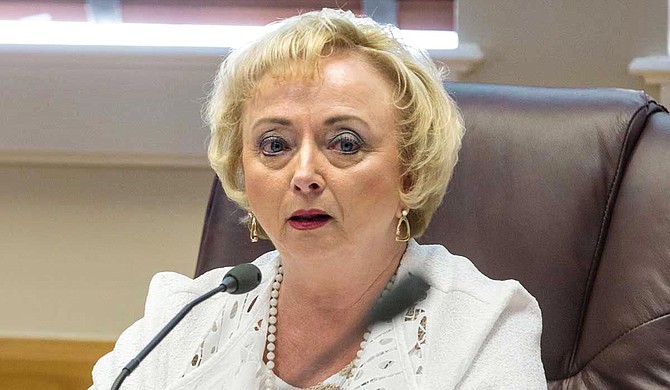“The disruption and stress caused by COVID-19 has had an impact on student performance in every state in the country," said Carey Wright, Mississippi's state superintendent of education. Photo by Imani Khayyam
JACKSON, Miss. (AP) — The number of Mississippi students learning at or above grade level in math and English decreased across almost every age group during the first statewide assessments amid the COVID-19 pandemic, according to results released by the Department of Education on Thursday. Still, the state's top education official said she was “very thankful that we did not fall further behind than we did.”
The scores reflect a trend across the country of decreased academic performance in standardized testing as schools deal with almost two years of disrupted learning due to the pandemic.
Math and English were subjects where students had steadily improving test scores in Mississippi since 2016, when the Mississippi Academic Assessment Program (MAAP) was first implemented. But the number of students learning at or above grade level in math declined from 47% in 2019 to 35% in 2021 — a 25% decrease. The number of students at or above grade level in English declined from about 41.6% in 2019 to 34.9% in 2021 — a 16% decrease.
The only area where students improved overall in 2021 was eighth grade English, where the number of proficient students increased 0.1% from 2019. A total of 35.6% of eighth-graders demonstrated proficiency in math in 2021, based on test scores.
“The disruption and stress caused by COVID-19 has had an impact on student performance in every state in the country," said Carey Wright, Mississippi's state superintendent of education.
MAAP measures student performance in English, math, science, and U.S. history. Students are assessed in grades 3 through 8 in English and math, grades 5 and 8 on science, Algebra I, Biology I, English II, and U.S. history.
The MAAP tests were first used in 2016, and overall scores in math and English had been improving year-to-year. Students were not tested during 2020 due to the coronavirus pandemic.
Students across the country have endured uneven academic years since the beginning of the pandemic. Mississippi had their school year cut short in spring 2020 when the pandemic shut down school buildings. Some continued learning virtually, while others did not return at all.
Though most Mississippi students had access to in-person learning most of the 2020-21 school year, hybrid learning, quarantining and weather-related school building closures curtailed learning.
Test scores among students have decreased this year across the country. Texas test results released in late June showed t he percentage of students reading at their grade level slid to the lowest levels since 2017, while math scores plummeted to their lowest point since 2013. In Florida, officials said reading scores dropped by 4 percentage points compared to 2019, the last time the statewide tests were administered. In Indiana, state officials are warning of a drop in reading scores and a “significant decline” in math.
Though overall scores decreased, student performance did not drop in every grade, subject and school in Mississippi. Ocean Springs School District improved its districtwide English proficiency level from 2019 to 2021.
Ocean Springs School District and Petal School District were in the state’s top 10 districts in all four subject areas. Rankin County School District, Clinton Public School District, Madison County School District and Enterprise School District were in the top 10 districts for performance in math and English.
In the bottom 10 for all four subject areas were Holmes County Consolidated School District, Humphreys County School District, North Panola School District and Yazoo City Municipal School District. The Mississippi Schools for the Blind and Deaf were in the bottom 10 for math and English.
While experts have warned that low participation rates in some regions could leave entire states with unreliable data, Wright said Mississippi is among the U.S. states with the highest rates of testing participation. Mississippi had a 96.9% participation rate in 2021, close to the 98% to 99% participation rates of previous years.
In Texas, 86% of students took the tests this spring, down from a typical rate of 96%.
Rachel Canter, executive director of Mississippi First, a nonprofit working to improve access to education in Mississippi, said the biggest question of the 2021 data would be “whether the forward progress Mississippi has been making for many years will be halted—or worse, reversed—by the disruption of the pandemic.”
Right before the scores were released, she said any improvement over 2019 numbers — or stability — would have been a huge victory for teachers and students.
“A decline would be tragic after many years of growth, though we can all understand why this may occur,” she said. "Whatever the case, finally knowing exactly where our kids stand is reason for hope because we will now know what our job is over the next few years."



Comments
Use the comment form below to begin a discussion about this content.
comments powered by Disqus